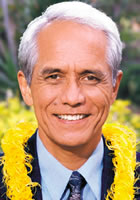The Republican Turned Democrat

Wednesday - September 26, 2007
|
 Del.icio.us
Del.icio.us
|
In 2002, Mike Gabbard translated his leadership of an eight-year struggle to ban same-sex marriage in Hawaii into a Leeward Oahu seat on the Honolulu City Council. He won a reapportioned two-year term, at the end of which - in 2004 - he ran as a Republican for the 2nd District congressional seat then held by Democrat Ed Case.
It turned into an often bitter contest - on both sides. In the end, the better-funded incumbent clobbered Gabbard.
Gabbard barely broke stride. In 2006, a Senate seat opened up in booming Kapolei and Gabbard announced as a Republican. He walked the district three times and defeated the Democrat, retired policeman George Yamamoto, by 1,500 votes.
Last month, after only one session as a member of the Republican minority of five in the Senate, Gabbard announced that he was switching his allegiance and joining the Senate’s overwhelming Democratic majority.
Why?
“I’m a political pragmatist,” says Gabbard. “I felt I could do more for my district in the majority than butting my head against a wall in the minority.”
Gabbard gave evidence of that pragmatism throughout the 2007 legislative session, voting repeatedly with the Democratic majority and for the interests of his district.
Gabbard cites another reason for his apostasy: the persuasiveness of daughter Tulsi, a legislative aide to United States Sen. Dan Akaka. In the same year her dad was winning a council seat, Tulsi GabbardTamayo won a Leeward state House race as a Democrat. When her Hawaii National Guard unit was deployed in 2004, she gave up the seat.
Two years later, she was back in Hawaii and involved in Akaka’s campaign against challenger Ed Case. With Akaka’s victory, Gabbard-Tamayo took a job in the senator’s Washington office.
“In 2002 I was struck by Neil Abercrombie’s genuine welcome of Tulsi when she first won election to the state House,” says Gabbard, “despite her name being Gabbard. In talking with Sen. Akaka and Congressman Abercrombie since, I’ve felt a welcoming atmosphere.”
Gabbard feels no ill will toward the Republicans he’s left. “I was always an independent Republican,” he says, “just as I’ll be an independent Democrat. It’s a working class thing. My father was a tech sergeant in the military, not an officer.”
While Gabbard cites the support he’s always received from working class labor unions - from carpenters to police to plumbers - and the “welcoming atmosphere” of elected officials like Abercrombie and Akaka, he knows full well that many progressive Democrats cringe at his signing a party card.
“A half-dozen party members have resigned over Gabbard,” says Mike McCartney, until recently the chair of the Hawaii Democratic Party. “And I’ve heard from probably 20 more who intend to quit. I respect that. But our party rules say that all are welcome. And Mike Gabbard certainly isn’t the only socially conservative Democrat in the Legislature. He’s like Sens. Bobby Bunda, Ron Menor, Norman Sakamoto and Rep. Joe Souki.”
Before Gabbard officially signed his Democratic Party card, McCartney arranged a two-hour talk story session between Gabbard and a group of party leaders. “Mike warned me that it could get ugly,” says Gabbard, “and it did.”
In the course of the afternoon, Gabbard apologized for anything he had said that had offended anyone during the long same-sex marriage debate. “But I reminded them that it worked both ways,” he says. “Offensive things were said about me as well.”
Gabbard is quick to note that 70 percent of the electorate agreed with him, voting a constitutional amendment to define marriage as between a man and a woman; and he takes pride in Hawaii and Alaska being the first to pass such amendments. “Our support came from every ethnicity, both parties, from Christians, Buddhists, Hindu,” he says.
Three years and three legislative sessions hence, Gabbard will face the electorate of the 19th Senatorial District again, this time - presumably - as a Democrat. He neither fears his constituents’wrath for changing parties nor thinks he will have any trouble winning a Democratic primary election.
“The vast majority of my supporters with whom I’ve spoken support my decision to change parties,” he says. “And with the labor support I enjoy, I can win a Democratic primary.”
E-mail this story | Print this page | Comments (0) | Archive | RSS Comments (0) |
Most Recent Comment(s):













